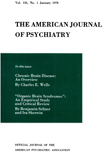DSM-III field trials: I. Initial interrater diagnostic reliability
Abstract
The interrater agreement for major diagnostic categories in studies using DSM-I and DSM-II was usually only fair or poor. In phase one of the DSM-III field trials the overall kappa coefficient of agreement for axis I diagnoses of 281 adult patients was .78 for joint interviews and .66 for diagnoses made after separate interviews; for axis II-- personality disorders and specific developmental disorders--the coefficients of agreement were .61 and .54. The interrater reliability of DSM--III is, in general, higher than that previously achieved and may be due to changes in the classification itself, the separation of axis I from axis II conditions, the systematic description of the various disorders, and the inclusion of diagnostic criteria.
Access content
To read the fulltext, please use one of the options below to sign in or purchase access.- Personal login
- Institutional Login
- Sign in via OpenAthens
- Register for access
-
Please login/register if you wish to pair your device and check access availability.
Not a subscriber?
PsychiatryOnline subscription options offer access to the DSM-5 library, books, journals, CME, and patient resources. This all-in-one virtual library provides psychiatrists and mental health professionals with key resources for diagnosis, treatment, research, and professional development.
Need more help? PsychiatryOnline Customer Service may be reached by emailing [email protected] or by calling 800-368-5777 (in the U.S.) or 703-907-7322 (outside the U.S.).



